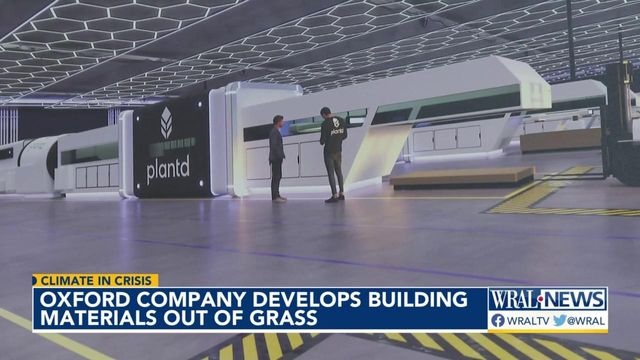Oxford company aims to cut carbon by using grass to build homes
Plantd, a climate tech company, is developing a manufacturing facility in Oxford to create plywood-like panels made from perennial grasses grown by local farmers. The company's co-founders say the carbon-negative materials could have a big impact on the high-emission construction industry.
Posted — Updated“We started the company to pull carbon from the atmosphere as fast as we can.,” said Josh Dorfman, co-founder and CEO of Plantd.
Dorfman said the company uses perennial grasses instead of wood to create carbon-negative building materials to make panels for homes. The company says the eco-panels are stronger and more moisture-resistant than traditional materials.
“We take carbon out of the atmosphere and we partner with home builders to lock it away in homes, which means 80% of the carbon that we capture on the farm is effectively locked away in the panels that go inside homes,” Dorfman said.
Now, Plantd founders are developing the company’s first commercial-scale production line in an 80,000-square-foot former tobacco facility in Oxford.
Nathan Silvernail, Plantd Co-Founder & COO, said choosing to take root in North Carolina was a no-brainer for the company.
“North Carolina was really appealing because we can get the industrial side right next to the agricultural side,” Silvernail said. “We can build a plant right next to where we grow all the material, which is super important for our CO2 sequestration rates.”
The engineering team has designed a novel manufacturing process, with presses that use a fraction of the energy of traditional wood mills.
“A lot of our challenges are to try to get as much of that material into the board as possible, minimizing waste and minimizing energy use,” said CTO & Co-Founder Huade Tan.
Plantd said it’s already established contracts with local farmers that used to produce tobacco to start growing perennial grasses for the company’s raw material.
“We’ve already proven that this is a great panel for residential housing as far as superior strength and moisture resistance. Now, it's proving out the manufacturing process itself and that it’s commercially viable,” Tan said. “And, that is heavy lift.”
Plantd leadership expects to start installing machines next week and for the Oxford plant to be operational by the end of the year.
Related Topics
• Credits
Copyright 2024 by Capitol Broadcasting Company. All rights reserved. This material may not be published, broadcast, rewritten or redistributed.





